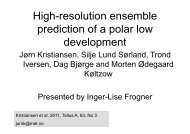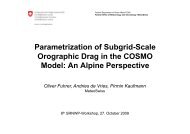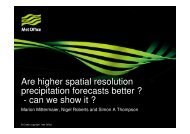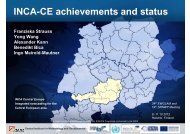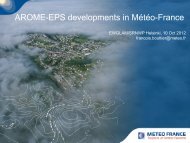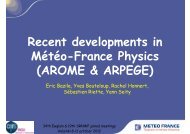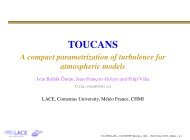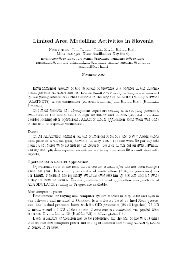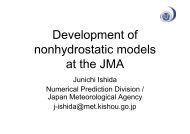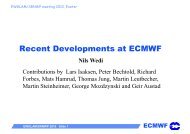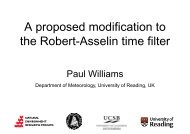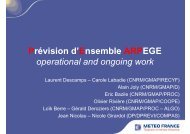Proceedings - C-SRNWP Project
Proceedings - C-SRNWP Project
Proceedings - C-SRNWP Project
Create successful ePaper yourself
Turn your PDF publications into a flip-book with our unique Google optimized e-Paper software.
expected to result in an improved representation of a number of processes and<br />
phenomena, including non-local transport of heat, moisture and momentum due to<br />
boundary-layer turbulence and shallow convection, triggering of deep cumulus<br />
convection, and stratiform cloud cover. This in turn is expected to lead to an<br />
improved forecast of several key quantities, such as the rate and timing of<br />
precipitation and the 2m temperature.<br />
For more details please see the report by D.Mironov on this Newsletter<br />
7. Tackle deficiencies in precipitation forecasts - <strong>Project</strong> leader: Marco Arpagaus<br />
(MeteoSwiss)<br />
Quantitative precipitation forecasting (QPF) is one of the most important reasons to utilize<br />
and pay for a numerical weather prediction model, both for forecasters and customers.<br />
Unfortunately, it is also among the most difficult parameters to quantitatively forecast for<br />
an NWP model, and the LM is not doing a particularly good job at it (other models may<br />
not be much better, though). This project aims at looking into the LM deficiencies<br />
concerning QPF by running sensitivity experiments on a series of well chosen cases which<br />
have verified very poorly. If successful, the outcome of these sensitivity experiments will<br />
suggest what parts of the model need to be reformulated and improved most urgently to<br />
obtain better quantitative precipitation forecasts. At the present stage, the list of cases is<br />
ready and the sensitivity runs are ongoing.<br />
8. Development of Short Range ensemble based on LM - <strong>Project</strong> Leader: Chiara Marsigli<br />
(ARPA-SIM)<br />
Thanks to COSMO-LEPS, COSMO already has experience in ensemble forecasting but<br />
mainly as a downscaling of the ECMWF ensemble with the main focus on the (early)<br />
medium range. This COSMO SREPS (Short-Range Ensemble Prediction System) project<br />
deals with the development and implementation of a short-range ensemble based on LM<br />
to fulfil some needs arisen in the COSMO community:<br />
(i) To have a short-range mesoscale ensemble to improve the support especially in<br />
situations of high-impact weather.<br />
(ii) To have a very short-range ensemble for data assimilation purposes (e.g. the SIR<br />
filter project and the possibility to evaluate the flow dependent model error<br />
statistics for the 1D-VAR system).<br />
The strategy to generate the mesoscale ensemble members proposed by this project tries to<br />
take into account all the possible sources of uncertainty and then to model many of the<br />
possible causes of forecast error. The proposed system would benefit of perturbations in<br />
the boundary conditions, perturbations of the model and, in the future, perturbations of the<br />
initial conditions. This project is carried on in close cooperation with the INM SREPS<br />
project. For more details please see the report by C. Marsigli on this Newsletter.<br />
9. Advanced Interpretation of LM output - <strong>Project</strong> leader: Pierre Eckert (MeteoSwiss,<br />
Genève)<br />
This project investigates several methods that can be used to exploit high resolution model<br />
output in an optimal way. Issues considered are the diagnosis of high impact weather, how<br />
to extract the most valuable information out of high-density fields, how to produce the<br />
best input for a forecast matrix or the driving of other models like hydrological models.<br />
During the last period the scope of this project has been enlarged to cover also verification<br />
methodologies for higher resolution models (1-3 km) which is strongly related to<br />
39



